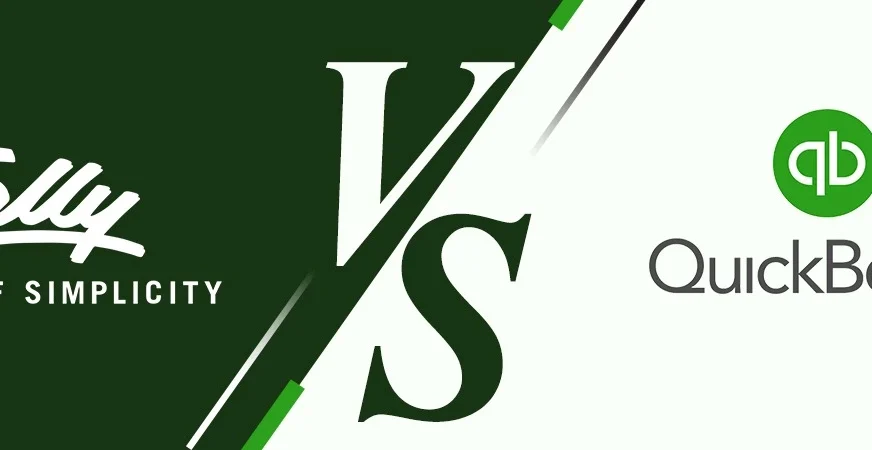Tally vs. QuickBooks for Indian Businesses: Which Is the Better Choice?
Introduction
Choosing the right accounting software is crucial for Indian businesses. Both Tally vs QuickBooks are popular options, each with unique benefits and features. In this article, we’ll compare Tally and QuickBooks to help Indian businesses determine which software suits their needs best.
1. Overview of Tally and QuickBooks
Understanding each software’s core purpose and features is essential before deciding which is better for your business.
What Is Tally?
Tally is an accounting software widely used in India. It’s known for its simplicity and focus on financial accounting and GST compliance. Tally is popular among small to medium-sized businesses for its ease of use in managing local tax requirements.
What Is QuickBooks?
QuickBooks, developed by Intuit, is a global accounting solution with extensive features beyond basic accounting. Its cloud-based design makes it accessible and scalable, fitting businesses of all sizes. QuickBooks offers strong integration with third-party apps, making it ideal for diverse business needs.
2. Key Features Comparison: Tally vs. QuickBooks
Both Tally and QuickBooks offer different features tailored to specific business requirements.
Features of Tally
- GST Compliance: Tally is optimized for GST, making it a top choice for tax filing in India.
- Inventory Management: It provides comprehensive tools for managing inventory levels, orders, and deliveries.
- Simple User Interface: Tally’s straightforward interface is easy for non-accounting users to navigate.
- Offline Accessibility: Tally operates primarily offline, a useful feature for businesses with unreliable internet access.
Features of QuickBooks
- Cloud-Based Access: QuickBooks allows users to access their accounts from anywhere, ideal for remote work.
- Expense Tracking: It offers automated expense tracking and bank account integration.
- Payroll Management: QuickBooks includes payroll processing, making it easier for businesses to manage salaries.
- Third-Party Integration: It supports integration with various apps, enhancing functionality for e-commerce, CRM, and more.
3. Pricing: Which Is More Affordable?
Pricing is a crucial factor for businesses, especially for startups and small enterprises.
Tally Pricing
Tally offers a one-time payment model, making it cost-effective in the long run. There are two primary versions:
- TallyPrime Silver: A single-user license, suitable for small businesses.
- TallyPrime Gold: A multi-user license, ideal for medium-sized businesses.
This one-time payment system makes Tally an economical option for businesses that prefer long-term cost savings.
QuickBooks Pricing
QuickBooks follows a subscription-based pricing model, offering flexibility but with recurring costs. Pricing depends on the version:
- Simple Start: Basic features for small businesses.
- Essentials: Includes bill management and multiple users.
- Plus: Offers project tracking and inventory management.
The monthly subscription may be higher over time but offers continuous support and updates.
4. User Interface and Ease of Use
Ease of use is important, especially for businesses with little accounting expertise.
Tally’s User Interface
Tally’s interface is simple, but it may require initial training. It’s well-suited for those with basic accounting knowledge, as it uses traditional accounting terms and formats. However, once learned, Tally is quick and efficient for regular users.
QuickBooks’ User Interface
QuickBooks offers a more modern and intuitive interface. Its cloud-based dashboard is user-friendly, making it easy for non-accounting users to navigate. Many users find QuickBooks’ interface easier to learn, especially for those without prior accounting experience.
5. Tax Compliance and Reporting
Tax compliance is a critical aspect for Indian businesses, given the frequent tax changes.
Tally’s Tax Compliance
Tally excels in GST compliance, making it a preferred choice for Indian businesses. Its tools are updated with the latest GST regulations, simplifying tax filing. The software is structured for Indian tax laws, making it highly relevant for local businesses.
QuickBooks’ Tax Compliance
QuickBook also offers GST compliance but may not be as India-centric as Tally. QuickBooks’ global user base means it offers broad tax features but lacks the local specialization that Tally provides. Still, QuickBooks is suitable for businesses with international clients or plans for global expansion.
6. Integration and Add-Ons
Integration with other applications can enhance business efficiency by connecting various tools and data.
Tally’s Integration
Tally offers limited integration with other software. While it’s great for standalone use, it may lack compatibility with some modern business tools. Businesses focused solely on local operations may find this sufficient, but larger companies may need more integrations.
QuickBooks’ Integration
QuickBooks supports a wide range of third-party integrations, including e-commerce, payroll, and CRM tools. This makes QuickBooks an ideal choice for businesses looking to automate and streamline multiple operations through connected applications.
7. Customer Support and Resources
Good customer support is essential, especially for small businesses that rely on quick issue resolution.
Tally’s Customer Support
Tally provides basic customer support via phone and email. However, its support resources are somewhat limited compared to QuickBooks. Tally users may need to rely on third-party consultants or training sessions for more complex issues.
QuickBooks’ Customer Support
QuickBooks offers extensive customer support, including 24/7 chat support and access to a knowledge base. Its support system is well-suited for businesses that need fast assistance or who may be new to accounting software.
8. Which Software Is Better for Your Business?
The choice between Tally and QuickBooks depends on your specific business needs.
Tally: Best for Small and Local Businesses
Tally is ideal for small to medium-sized Indian businesses with primary focus on local tax compliance and inventory management. Its offline functionality and one-time purchase model make it budget-friendly and reliable for local operations.
QuickBooks: Best for Growing or Global Businesses
QuickBooks suits businesses seeking scalability, integration, and advanced reporting tools. If you operate online or have plans for international expansion, QuickBooks is a better option for its cloud capabilities and integration options.
Conclusion
When considering Tally vs QuickBooks, think about your business’s size, goals, and budget. Tally is a solid choice for Indian businesses that require straightforward accounting and local tax compliance. QuickBooks, with its cloud access and integrations, offers versatility for growing companies. Choose the software that aligns with your business needs for streamlined operations and financial success.










